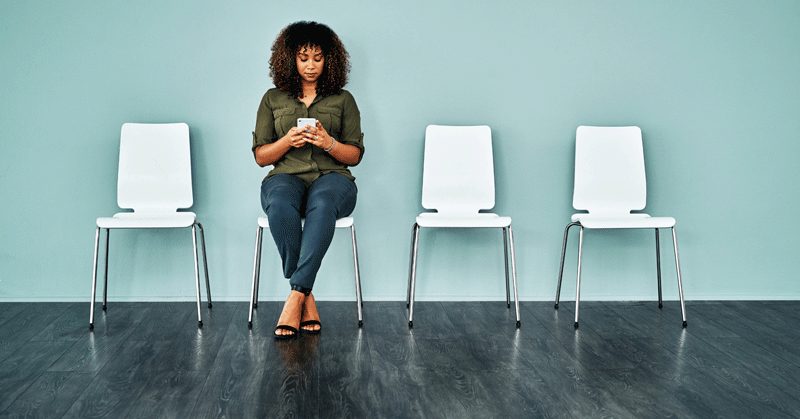The telephone interview
This is your ticket to an in-person interview. Sound alert and interested. Keep background noise and other distractions to a minimum. Have your resume handy to refer to. When you make an appointment, be sure to write down the correct name, date, name, and title of the person you will be seeing, the company’s address, phone number, and directions.
Be flexible when scheduling an interview
Flexibility is a key asset for any employee! Restricting the times you are available may make it appear you are not too interested in the position or you may appear difficult. Know what your resume says Even though you have your resume with you, always be prepared to cite your background and work experience accurately from memory. Be prepared to describe gaps in your employment history and reasons for leaving a previous job. Most interviewers will ask questions about these areas and expect reasonable explanations.
Be prepared to complete an application
The application is a legal and standard document used by each company. Fill out the application accurately and never lie. Even if you bring a resume, be prepared to complete all sections of the application completely and thoroughly. Your application will become part of your permanent personnel file should you be hired.
Have a realistic salary expectations
Keep in mind the local economy, cost of living, and total benefits package offered. On the application where it calls for salary, our best suggestion is to write “open” or “negotiable”. Doing otherwise may hurt your chances of getting an offer, especially if your expectations are too high.
Do your homework
Researching the company before your interview will help you determine whether it is a company for which you would like to work, based on their position in their industry and financial stability. In addition, it will give you an opportunity to sound knowledgeable during the interview. Also, if in doubt about the company’s location, identify its loca*on the day before to make sure you can find it. If you have a computer with Internet access, it can be a very valuable tool for researching a company.
The importance of the Receptionist
Recognize the Receptionist as a bridge between you and the interviewer, and sometimes even getting the job. Be courteous and friendly. It is not uncommon that any negatives about how you present yourself in the lobby or over the phone will be passed on to the interviewer.
Package yourself, First impressions are crucial!
The interview is your only opportunity to make a first impression. A rule for thumb is to dress in appropriate aSre for the position or business setting which you are interviewing. Appropriate clothing is clean, neat, and well pressed goes a long way towards making a favorable impression. Personal grooming is essential; cleanliness, hairstyle, and makeup are all part of your personal image and are very important to your success in the interview. Be sure not to overdress and it’s best to omit the cologne!
Practice makes perfect!
Find a family member or friend to role-play with or practice in front of a mirror. Many interviews consist of similar types of questions. Practice explaining your work history, short and long-term career goals, and strengths and weaknesses. Also spend me practicing your posture, handshake, and eye contact. By practicing ahead of me you can be more comfortable when the questions arise.
Listen! Listen! Listen!
Don’t talk yourself out of a job! Answer the questions as concisely as possible. Avoid elaboration unless it is requested. Keep your conversation directed at your previous experience and responsibilities. Avoid discussing company politics, your former employer, or any negatives about co-workers, events, or the company.
Body language
Much emphasis is placed on the unspoken communication in the interview – the body language, eye contact, posture, handshake, and manners.
When being introduced to the interviewer, be sure to give a firm handshake, make eye contact, and smile! A limp, cold, fishy handshake will communicate the wrong signals about yourself and your energy levels. A firm handshake says you are confident, composed, and happy to meet them! Once seated in the interview, sit straight and squarely in the chair with your hands folded in your lap. Good posture helps you look self-assured.
The interviewer’s body language will show you how you are doing. A red flag to look for is if the interviewer is looking bored, annoyed, or distracted. If you notice any of these signs…stop and change direction! Ask if you are answering the questions properly to get a sense if you are on the right track.
Stick to business
Generally speaking, the interview should focus on matters relating to the job opening: i.e.: work experience, education and training, and your ability to handle the responsibilities. The interviewer may bring up a hobby or outside interest if you have them listed on your resume.
This will give you the opportunity to talk about yourself…but keep it brief! It is not appropriate to ask the interviewer any personal or non-business questions.
Strengths and weaknesses
Be honest about your strong points whether they are skill or personality related. However, you must show the maturity to have insights into those facets of your skills, personality, or work habits that you have had to develop or perhaps need
improvement. No need to put your worst foot forward such as informing the interviewer that you are a procrastinator. Also, be prepared to list 3 weaknesses that are not camouflaged as strengths. Skill-related weakness is acceptable, such as your desire to learn more accounting or software skills, as long as they are not directly related to the job for which you are applying.
Good manners are not old-fashioned
Your conduct in the interview is just as important as what you say! At every step of the interview process, you are on display. Good manners are not old-fashioned! Shaking hands, saying “please”, “thank you”, “May I sit down are you?” go a long way in enhancing your personality profile. Never smoke, eat, drink, or chew gum during the interview. Avoid leaning on the interviewer’s desk; by doing so you are invading the interviewer’s personal space and you may be eliminated and never know why!





